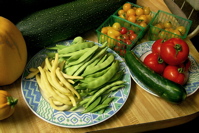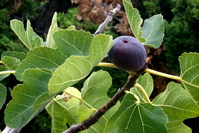Mulching for Synergy
To mulch or not to mulch, that is the question. Whether 'tis nobler to ... oh, wait, this is a garden blog, not a literary blog. Seriously, though, you'll see a lot of advice about mulch: what kind, when to do it, how to do it, and often the basic principles of mulching go somewhat neglected. There are three basic reasons to mulch your garden. They all boil down to controlling or influencing the soil environment: temperature, light, and moisture. Organic gardeners add a couple of reasons of their own to that list, namely soil bioactivity and fertilization. Mulching is powerful but unglamorous, and we don't have a stable of pictures ready to go on the glorious topic! By the way, mulching isn't just for gardens in the ground. Raised beds, windowbox planters, and ordinary pots all benefit from good mulching.
Temperature Mulch can act as an insulator, keeping soil warmer at night in the spring, or preventing it from heating up as much in the summer. Many vegetable crops have shallow roots. As the soil heats up in spring and summer, the higher soil temperatures, along with the changing length of day, send a powerful signal to bolt and go to seed. Mulching your cool-season crops in the fall helps keep them warm in the winter, and refreshing the mulch after the winter rains helps extend your spring season. Summer crops can also be put in earlier with mulch than without it, if you mulch in the late afternoon while the soil is warmest and use a thick layer that will help retain heat overnight.
Light When you till or fluff your soil in the spring, you help let sunlight into the soil to warm it. That same sunlight also triggers the growth of buried weed and grass seeds. By mulching your garden, you can control where the light reaches the soil. When you wish to plant seeds, simply scrape aside the mulch in that area along the row directly where you'll sow the seeds. For scattered crops, like hills of squash, you can uncover only the exactor spot where you want to plant. Mulch won't eliminate all the weeds, but it will cut down on them dramatically. Depending on what you use for mulch, the color of the mulch can make weeds easier to see as well!
Moisture Here in the Bay Area, we're having an oddly prolonged rainy season. Eventually it will stop, though, and then for many months there'll be no water in the garden other than what we add to it. The clayey soil in much of the Santa Clara Valley has a tendency to bake into pseudo-adobe in the sun. Mulch to the rescue! A layer of mulch creates a barrier to evaporation. If your soaker or drip system is covered by the mulch, so much the better-- all of the water will get into the ground where it belongs, and tend to stay there longer.
Unmulched gardens around here tend to get easily water-stressed, as the soil dries hard in a way that makes water run off, rather than soak in like a sponge. Having a high percentage of biological material in your soil (compost, organic matter, etc) helps hold water, the sun here is just too strong for most gardens and dries out the top two or three inches of soil. As we'll see in a moment, those few inches are fairly critical!
These are the conventional reasons for mulching. Organic gardeners have even more reasons for a good mulch strategy. Read on!
Soil Bio-Activity In organic gardening and permaculture, we actively aid and maintain the soil as a type of living organism in and of itself. In the first several inches of soil there are distinct layers of bio-activity that assist plants in growing, in a symbiotic or synergistic realtionship. Those few inches are where mycelium threads, soil helpers, beneficial bacteria, and other garden buddies are supposed to be at work. Mulch keeps things cool and moist and dark for them, and allows us to condition the soil directly. Isn't this just "temperature, light, and moisture" all over again? Yes and no-- we're acting on behalf of the soil rather than the plant, and may mix things into the mulch, or mulch in layers, to "feed" the soil as an organism.
Fertilization Speaking of fertilizer, that's what mulch can become if used correctly and well. While any mulch will eventually break down and become part of the topsoil, not all mulches are created equal in fertilizer value. As organic gardeners, we prefer to use a variety of mulches and layered mulches to help assist the garden in being productive.
Straw has tremendous insulating value, but usually little fertilizing value. Decomposition of cellulose material like straw or sawdust can actually decrease the amount of available nitrogen in the soil. Watch out for this when applying animal manures, as many manure mixtures are mostly sawdust, shavings, or other bedding material. They'll add nitrogen after many weeks of decompostion, so they're a great choice for a garden plot that is going to stay fallow or just grow a cover crop over the winter.
Alfalfa pellets break down into nitrogen for a long slow boost to plants, and decompose more quickly than straw or shavings or leaves. For a quick pick-me-up, try coffee grounds. They are 'hot', like chicken manure, and supply quick nitrogen. Unlike chicken manure, coffee grounds won't give your plants chemical burns.
Strata's Pick: Cocoa Bean Shells
My favorite mulches that combine fertilization with good insulation are the shredded cocoa-bean shells sold widely at hardware and garden stores. They smell wonderful, build up nice air gaps for good thermal insulation, and draw worms up from the deeper soil like crazy. I have never seen so many worms as when I mulch with cocoa shell.
Why the worm excitement? Worms aerate the soil and make it more friable (crumbly, workable) so that plant roots can grow more efficiently. Worm castings (a fancy name for worm poop) are GREAT fertilizer, and by encouraging the worms to come poop near the surface, the shells contribute fairly quickly to the soil fertility. Sorry to be indelicate here, but worms are basically tubes that eat, and what comes in must displace what came before. (Fellow geeks: worms are FIFOs).
As an added bonus, the cocoa shell mulch also seems to discourage snails and slugs. I occasionally see a shiny trail across them, but only rarely. A mulch of crushed eggshells has been noted as good for repelling slugs and snails, so perhaps the cocoa shells work similarly. I'm just pleased with the results so far.
Practical Tips
- Get to it while the soil is still moist with spring rain.
- Don't rake or till the soil before mulching; you disturb fewer weed seeds that way.
- Mulch should be near, but not touching, the stem of the plant-- some mulches can trigger fungal withering of plant stems. Great vs weeds, not so great for your peppers and lettuces!
- If you have a ton of weeds, weed first, then mulch. If the weeds haven't taken over yet, pull the biggies and try to kill the little ones by simply mulching over them.
- Use dark mulch to warm soil, light colored mulch to cool it or to reflect sunlight up into the plants.
- Scrape back mulch to side-dress plants with compost later in the season, water in the compost, and then re-mulch.
- Try to put soaker or drip hoses under, not over, the mulch. Mulch can soak up water and keep it from getting to your deeper soil layers if the drip/soak line is on top of the mulch.








2 Comments:
I've gotten about 1.3 bajillion forwards from my family about the dangers of using cocoa shell mulch around pets. The forwards note that dogs particularly find this mulch delicious, but deadly poisonous.
Is this true or an email legend?
Hi Lauren,
It's partly true, according to Snopes: http://www.snopes.com/critters/crusader/cocoamulch.asp
Theobromine and caffeine in chocolate are harmful to dogs, but many cocoa mulch vendors claim their mulch goes through a high-heat process that strips any cocoa butter from the hulls. I would believe it, given that cocoa butter is very valuable in the cosmetics and food industries.
If you have a 'hoover' dog, though, like a labrador, who eats anything, you might want to read up on it and make a decision for yourself.
cheers, and thanks for asking,
Strata
Post a Comment
<< Home